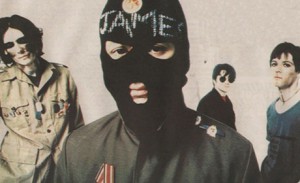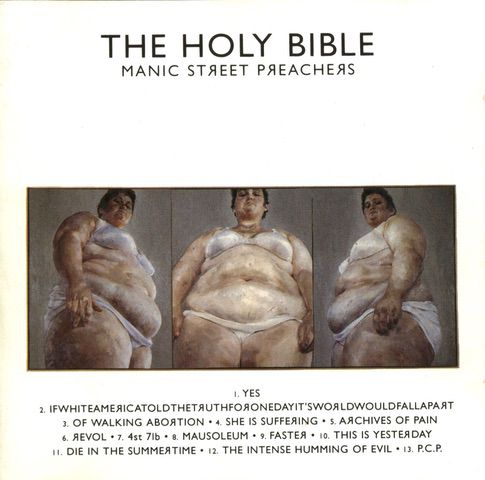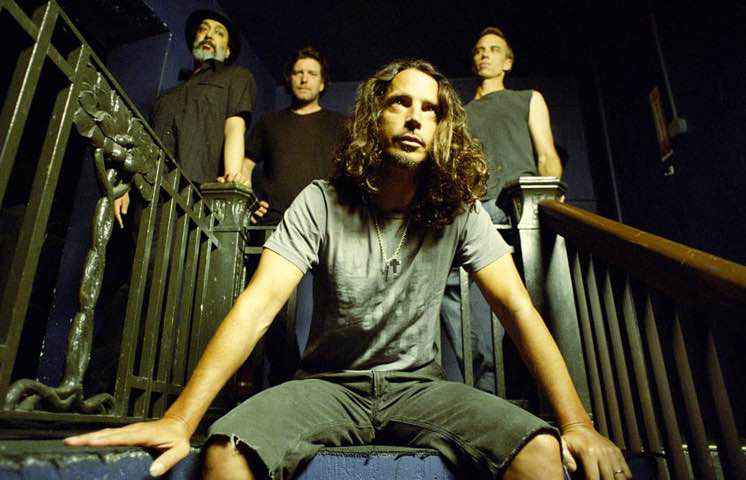Considered the ‘darkest album in the history’ of music, and rated by BBC’s Newsnight as the best album of all time, the enduring popularity and relevance of The Holy Bible is all the more remarkable given its grim tone and themes.
Two decades after the Manics’ iconic third album was released, James Dean Bradfield, Nicky Wire and Sean Moore are commemorating The Holy Bible’s anniversary with a series of highly anticipated shows in December, beginning in Glasgow on 8th December and culminating in three nights at Camden’s historic Roundhouse.
Tickets at all major sellers for the The Holy Bible shows were reported to have sold out in minutes.
While that might be an indication of the band’s lasting popularity, it is also a testament to how much of a place that 20 year-old album has.
I can actually remember clearly the very moment that first drew me into the Manic Street Preachers’ world and into the Our Price store to buy The Holy Bible as a then-impressionable 14 year-old; it was seeing the band’s TOTP performance of Faster in June 1994. One look at James Bradfield performing on prime-time BBC in his paramilitary-style balaclava and I was hooked.
I never originally caught Kurt’s Gregorian-style Smells Like Teen Spirit on TOTP in ’91, so as far revelatory TOTP moments go, mine was James, the Manics and Faster in ’94. That performance resulted in a record number of complaints, with over 25,000 people up in arms over James’s face-mask.
I, however, was hooked from that moment on; though I’d been so mesmerised by the sheer visual element of the band that it wasn’t until I listened to the CD that I realised how brilliant a song Faster actually was.
And the rest of the album simply continued that mesmerisation process. It was an extraordinary piece of work by a band at the height of its four-way powers. As great as that record is/was and as precious as it was to so many people of that age and at that time, I didn’t imagine that two decades later it would be regarded as one of the great works of all time. I don’t think we ever foresee that happening; I seem to remember at the time that the album didn’t do that well commercially.
The Holy Bible, however, is the Manics’ masterwork; a fact that even the band members themselves seem to generally acknowledge.
The Holy Bible, thematically speaking, is no walk in the park; not a record made for radio play, parties or car drives. The themes deal with subjects including American consumerism, British imperialism, freedom of speech, the Holocaust, self-starvation, prostitution, serial killers, fascism and suicide, among other equally sunny things.
Which is unsurprising for the album that is regarded as Richey Edwards’ defining artistic statement (although 2009’s Journal For Plague Lovers might now be regarded that way instead). While the lyrics on Generation Terrorists and Gold Against the Soul were said to have been split equally between Richey and Nicky, the Holy Bible lyrics are said to have been up to 75% Richey’s work (according to Bradfield).
As such the lyrical journey across the album’s tracks is a dark one. Drummer Sean Moore once described the lyrical content as being “as far as Richey’s character could go”, while James Bradfield admitted “Some of the lyrics confused me. I remember getting the lyrics to ‘Yes’ and thinking, ‘You crazy fucker, how do I write music for this?'”
One of the stated influences on the the album was the band visiting the Dachau concentration camp. Two tracks in particular, the brilliant Mausoleum and the unsettling The Intense Humming of Evil, have been cited by Nicky Wire as having been inspired by visits to both Dachau and Belsen.
Unsurprising then that The Holy Bible didn’t get the kind of commercial coverage that the later Everything Must Go era did.

Long-term perception of the album is further coloured by subsequent events, in particular obviously the disappearance of the album’s chief lyrical architect Richey Edwards in February 1995, The Holy Bible being both his final contribution to the band and his defining work. Even prior to Richey’s disappearance, however, the album was already somewhat coloured by his situation. While promoting the album, Richey’s drinking and self-harming had escalated. During the Thailand tour he had slashed his chest onstage with a knife, while once back in the UK he cut himself so severely that he ended up in an NHS psychiatric ward.
For all that, I have never considered The Holy Bible as the ‘depressing’ record that many music journalists describe it as.
Dark, yes, but not depressing; certainly not compared to, say, Joy Division. Much as I love Joy Division, I find myself avoiding listening to them a lot of the time just for how grim it makes me feel. The Holy Bible, on the other hand, is balanced with offerings that are actually sonically uplifting, even if they remain lyrically otherwise; the aforementioned ‘Faster’, for example, or the single ‘Revol’.
Along with things like Nirvana’s In Utero and Hole’s Live Through This (which also turned twenty this year), the Manic Street Preachers third album was one of the defining albums of my formative years and remains one of my all-time top five. I was fascinated by The Holy Bible as a young teenager; and like Nirvana’s In Utero, with every aspect of it, from the music and the extraordinary lyrics to the imagery both actual and evoked.
The strange samples and audio montages in the spaces between tracks is also one of the album’s defining aspects; the samples are a bleak hotch-potch of audio, including a J.G Ballard quotation, an extract from the Nuremberg Trials and dialogue from 1984 spoken by John Hurt. At the time those samples compelled me almost as much as the music, as I strained my ear, pressed against shitty stereo speakers, to hear what was being said.
However, with everything else that gets said about The Holy Bible and the focus on imagery or on Richey’s lyrics, people sometimes forget just how good the songs are on the basic level; literally every track is gold dust, but Faster and Mausoleum are probably the Manics’ greatest ever singles, while Die in the Summertime remains my personal favourite Manics song.
While everything else, from Of Walking Abortion to Ifwhiteamericatoldthetruthforonedayit’sworldwouldfallapart, is utterly compelling listening, even twenty years later.
The musicianship is stunningly good, the interplay incredibly tight: Sean’s drumming is epic (listen to the drumming on ‘Yes’, for example), and James’s vocals are ridiculously powerful (even when he is struggling to fit all of Richey’s lyrics into the vocals – an extraordinary feat in itself). James’s vocals sometimes get overlooked when people talk instead about Richey’s lyrics – but that man’s voice is monumental. That man’s voice could bring down the walls of Jericho.
This was a band hitting a level that few bands ever do. ‘Faster’ and the hauntingly beautiful ‘She is Suffering’ should’ve been hit singles or iconic benchmarks of their era.
Interestingly the upcoming Holy Bible shows don’t only mark two decades since the album’s original release, but also nearly two decades since the notorious run of shows at the London Astoria, culminating in their last live performance with Richey (who disappeared two months after the Christmas performance). That gig, now part of the annals of rock n’ roll history, ended with the band smashing up not just their equipment, but the venue’s lighting, causing an alleged £26,000 worth of damage.
Ah, rock n’ roll – back in the days when it mattered. And when it could feel genuinely dangerous; and genuinely visceral.
Alas, we can’t use time-machines or recapture those days of rock n’ roll potency, but these 2014 shows are a rare opportunity for fans of the band, and especially of that album in particular. The only previous time the band have played an album in full was in 2009 after the release of that year’s Journal For Plague Lovers, the album constructed from lyrics left by Edwards.
Meanwhile a 20th anniversary edition of The Holy Bible is still officially being talked about, but details are still not available.
I wonder sometimes if the band members ever get annoyed by how a big a deal The Holy Bible still is to so many people, particularly given that these Holy Bible anniversary gigs might end up getting more coverage than this year’s new Manics album (the excellent Futurology) did; but it’s their own fault for producing such a fucking amazing piece of work in the first place.





Excuse me, but a 20 anniversary edition is going to be released, in fact the 1,000 signed copies went sold in three (3) hours on the official website.
That’s great. I wasn’t aware of that; thanks for telling us.